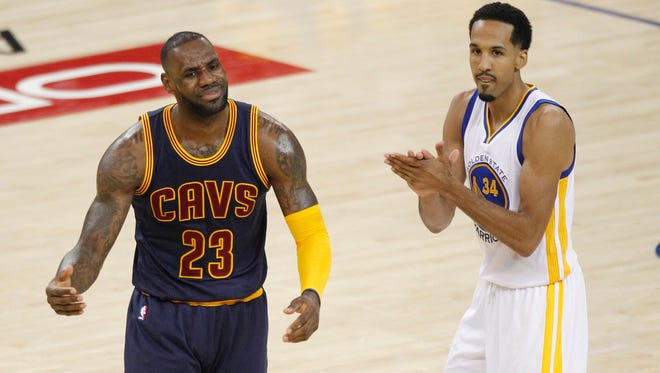Jerry West: Criticism of LeBron James is 'grossly unfair'

OAKLAND – The irony is lost on no one.
Jerry West, a Golden State Warriors executive board member since 2011, is serving as inspiration for the man his team is trying to take down for a second consecutive season: the Cleveland Cavaliers’ LeBron James.
All postseason, through the series wins over the Detroit Pistons, Atlanta Hawks and Toronto Raptors and on to the Cavs-Warriors NBA Finals that resume with Game 2 on Sunday, the four-time MVP has been reading West’s autobiography, “West by West, My Charmed, Tormented Life,” that offers such a dark and honest window into his world.
No one knows James’ playoff pain like West, the Hall of Famer and Los Angeles Lakers legend who lost eight of the nine NBA Finals in which he played and who admits in the book that it brought him to the brink of early retirement. James, who has made this memorable trek from Cleveland to Miami and back in the past 13 seasons, has lost in four of his six Finals.
Yet when West was asked on Saturday about the constant scrutiny surrounding James, this endless discussion on his legacy and what another Finals loss might mean, his Warriors’ loyalties didn’t matter nearly as much as his appreciation for greatness. James, West made clear, doesn’t deserve the criticism that always seems to come his way.
“That’s the most ridiculous thing,” a fiery West said while surrounded by more than a dozen reporters at Warriors practice. “If I were him, frankly I’d probably want to strangle you guys (in the media), OK? No, it’s ridiculous. He carried teams on his shoulders. They’ve been in the Finals six straight times. How many times have they been the favorite? None. Zero, OK? Grossly unfair to him.”
An emotional LeBron James discusses Muhammad Ali's legacy
That part is up for debate, as James’ teams have lost Finals appearances in which they had the homecourt edge going in. But West’s point, one that he shared with the same raw emotion for which he has so long been known, certainly stands.
“It’s hard for me to believe that someone doesn’t recognize his greatness,” West continued. “It’s hard for me to believe. This guy does everything. He’s like a Swiss Army knife. He does everything, and he’s competitive as hell and frankly I wish people would leave him alone.”
The parallels between their respective paths are impossible to ignore. Both grew up with modest means, West in the West Virginia mining town of Chelyan and James in Akron, Ohio. Both were celebrated as they entered the NBA, West as the No. 2 pick out of West Virginia in 1960 and James as the top pick from St. Vincent-St. Mary high school in 2003. Both went on to have careers that were, and are, as spectacular as they were imperfect.
So when the Miami Heat lost to the Dallas Mavericks in the 2011 Finals, James’ second failed attempt in two tries that sparked a summer’s worth of skepticism that he would ever be a champion, he decided to reach out to both West and fellow great Isiah Thomas (who was 2-1 in the Finals but didn’t get there until his seventh season) for insight. James and West have had a unique relationship that they both cherish ever since.
Jerry West on Muhammad Ali: 'You almost felt a God-like presence around him'
“I know LeBron; let’s put it that way,” said West, who is the only player to win Finals MVP while playing for the losing team (1969). “I greatly admire what he has accomplished. I know him, OK? It is flattering (that he’s reading his book), and he knows that I like him. He knows that. And he knows I admire the way he plays.”
West, of course, wants his Warriors to finish this job after they controlled most of a Game 1 win on Thursday. But as James continues writing the chapters of his own tale, he wants the basketball world to remember the lessons learned from his career too.
“Just how hard it is,” West said when asked what James could learn from his book. “Regardless of what you do as an individual, just how hard it is.
‘By three (Finals losses), I didn’t want to play anymore. I just didn’t want to do it. It took so much out of you … It’s like, here’s a store window, OK? And when you’re little, there’s candy behind that window. You can almost touch it, but you can’t get there.”